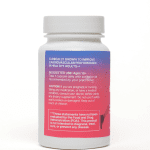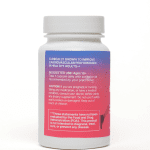MyoMax
MITOCHONDRIAL SUPPORT
MyoMax is a high-dose, 100% soy-free vitamin K2 (MK-7) supplement formulated to support healthy mitochondrial function.
How to buy
- Practitioner
- Patient
- Customer
A valid Practitioner account is required for direct purchases from our website. Let’s get you registered!
Practitioner Locator Coming Soon. In the meantime, please contact us for your nearest practitioner. If you already have a practitioner and they have referred you to this site, please register as a patient here.
Registered practitioners can login here to purchase at practitioner price.
Practitioner Locator Coming Soon. In the meantime, please contact us for your nearest practitioner. If you already have a practitioner and they have referred you to this site, please register as a patient here.
Registered practitioners can login here to purchase at practitioner price.
At a Glance
What is MyoMax
MyoMax is a high-dose, 100% soy-free vitamin K2 (MK-7) supplement formulated to support healthy mitochondrial function. This formula includes 300 mcg of vitamin K2 with calcium pyruvate to support ATP production. *This formula is safe for patients taking anticoagulants like warfarin.
Why MyoMax?
- 40-50% increase in ATP production within mitochondria
- 12% increase in cardiac output
- Improves aerobic capacity from cellular level
- Extends duration of peak fitness by 20-30%
- Increases efficiency in training and sports performance
One of the main reasons that aerobic athletic performance declines with age is that the body becomes less effective at utilizing oxygen. The maximal ability to utilize oxygen can be measured by VO2max, an assessment of how much oxygen your body can use per kilogram of body weight. As a result, a high VO2max will indicate that a person can effectively utilize oxygen, which is often seen in well-trained endurance athletes.
Unfortunately, after the age of 30, VO2max will begin to decline. For non-athletes, VO2max tends to decline by about 10% every decade. However, athletes who continue their rigorous training can reduce the decline to only 5% every decade. The main reason that VO2max declines with age is because the maximal heart rate (max HR) decreases as well.
Cardiac output = stroke volume x maximal heart rate
Because cardiac output is the product of stroke volume and maximal heart rate, a decrease in max HR will directly decrease cardiac output, and in turn, oxygen delivery to the muscles. This translates to a lower VO2max and decreased athletic endurance with age. Fortunately, vitamin K2 appears to improve cardiac output by maintaining healthy mitochondrial function.
As the “powerhouse” organ, we heavily depend on our hearts for optimal muscle and body tissue function. Adequate intake of vitamin K2-7 has shown to lower the risk of vascular damage because it activates what is called matrix GLA protein (MGP). MGP prevents calcium from depositing in vessel walls and joint spaces.
Vitamin K2-7 is the driver that takes free calcium from the blood, deposits from the arteries, and joint spaces sending it to the bones – thus improving cardiovascular health and bone health. In recent studies, the supplementation of Vitamin K2-7 improved cardiac output by 22% at resting heart rate and 12% at maximum heart rate. This is the definition of performance enhancement. Clinical trials have demonstrated 6-weeks of Vitamin K2-7 supplementation has the ability to increase strength, endurance, cardiovascular, and bone health.
Take 1 capsules daily with a meal, or as directed by your healthcare practitioner.





